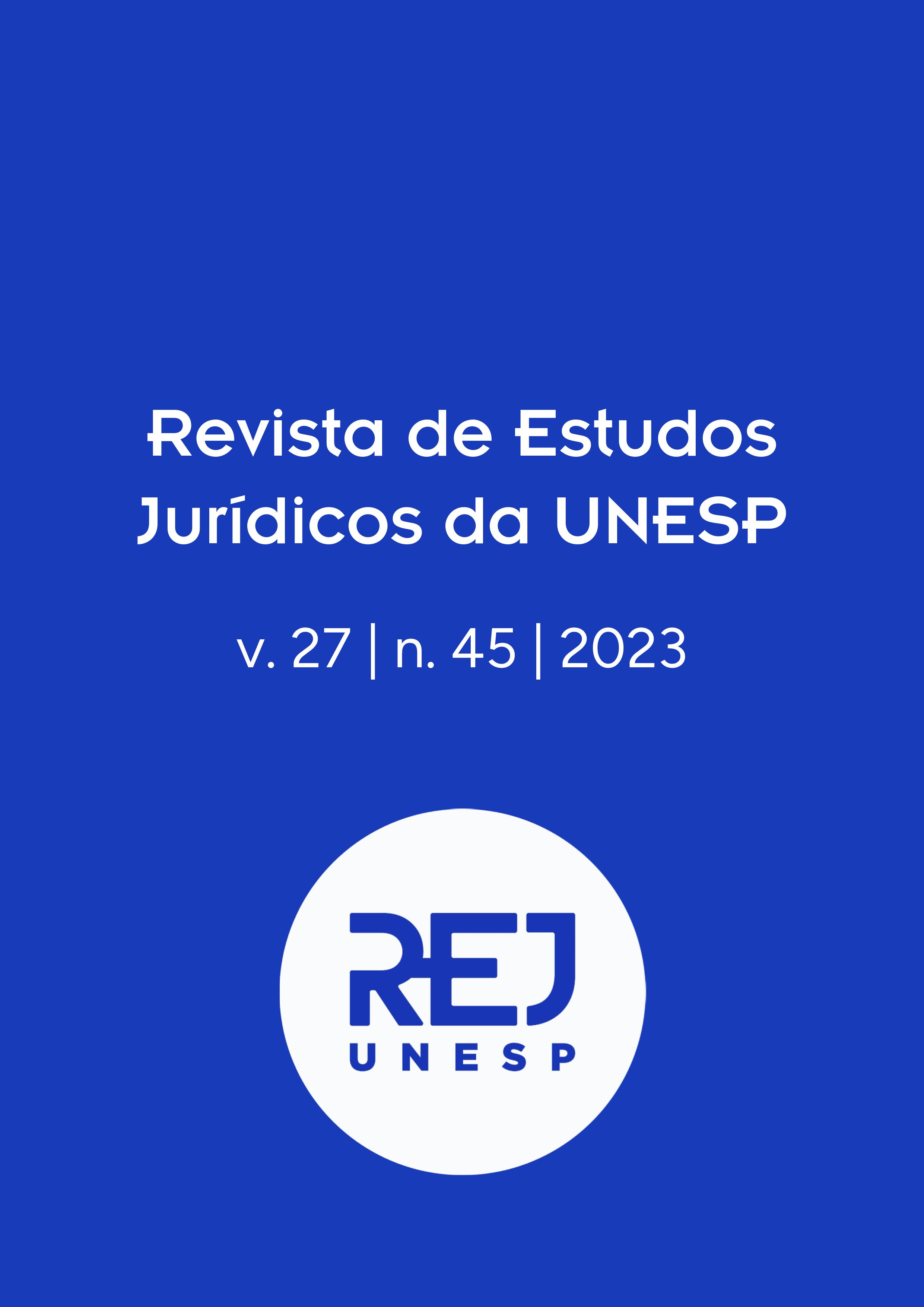O SUPREMO E O EXERCÍCIO DO PODER CONTRAMAJORITÁRIO
EXISTEM GARANTIAS INSTITUCIONAIS DE QUE A CORTE AGIRÁ COMO UMA "VANGUARDA ILUMINISTA"?
DOI:
https://doi.org/10.22171/rejunesp.v27i45.3677Palavras-chave:
STF, neoconstitucionalismo, accountability, poder contramajoritárioResumo
Partindo do pressuposto estipulado pelo ministro do Supremo Tribunal Federal, Luís Roberto Barroso, de que a Corte deve exercer uma função iluminista e contramajoritária na defesa das minorias e dos direitos fundamentais, o presente artigo busca resposta no sentido de averiguar se existem mecanismos institucionais vigentes que sejam capazes de garantir que a decisão do Supremo siga esse viés garantidor. Para tanto, foi utilizado o método hipotético dedutivo de modo a investigar a possibilidade de controle e avaliação das decisões da Corte por três diferentes enfoques. Em um primeiro momento, buscou-se compreender se o Supremo possui accountability vertical e se esse é um mecanismo apto a garantir que as decisões da Corte sigam o escopo afirmado pelo ministro. Em sequência, investigou-se o instituto da accountability horizontal e sua possível aplicabilidade ao STF. Por fim, o objeto de análise passou a ser o Regimento Interno da Corte, em busca de possíveis garantias de vinculação do fim almejado e afirmado pelos Ministros de forma individual. Ao final da pesquisa, conclui-se que, apesar do posicionamento dos autores de vertente neoconstitucionalista – em especial a figura do ministro Luís Roberto Barroso – e apesar de o Supremo poder sim exercer o papel de “vanguarda iluminista, encarregada de empurrar a história quando ela emperra”, nada garante que ele assim o faça, tratando-se de movimento de mera discricionariedade dos Ministros que ocupam as cadeiras da Corte, sem nenhuma garantia constitucional ou institucional, bem como sem nenhum tipo de controle ou possibilidade de punição para os casos em que o objetivo não seja cumprido.
Downloads
Referências
ALEXY, Robert. Direitos Constitucionais e Fiscalização da Constitucionalidade.
Boletim da Faculdade de Direito da Universidade de Coimbra 88. n. 2 (2012): 511-526.
ARGUELHES, Diego Werneck; RIBEIRO, Leandro Molhano. Ministrocracia: O Supremo Tribunal individual e o processo democrático brasileiro. Revista Novos Estudos – CEBRAP. São Paulo, v. 37, nº1, p. 13-32, abr. 2018.
BARROSO, Luís Roberto. A razão sem voto: O Supremo Tribunal Federal e o governo da maioria. Revista Brasileira de Políticas Públicas, Brasília, v. 5, Número Especial, 2015, p. 23-50.
BELLAMY, Richard. The Democratic Qualities of Courts: A Critical Analysis of Three Arguments. Representation, vol. 49, nº3, p. 333-346, 2013.
BRASIL. Constituição da República Federativa do Brasil. Brasília, DF: Senado Federal: Centro Gráfico, 1988.
BRASIL. Lei 10461 de 17 de Maio de 2002. Acrescenta alínea ao inciso I do art. 23 da Lei no 8.977, de 6 de janeiro de 1995, que dispõe sobre o Serviço de TV a Cabo, para incluir canal reservado ao Supremo Tribunal Federal. Disponível em: http://www.planalto.gov.br/ccivil_03/LEIS/2002/L10461.htm#:~:text=L10461&text=LEI%20No%2010.461%2C%20DE,reservado%20ao%20Supremo%20Tribunal%20Federal. Acesso em: 20 abr. 2022.
BRASIL. Supremo Tribunal Federal (STF). Regimento Interno [recurso eletrônico] /Supremo Tribunal Federal. – Brasília: STF, Secretaria de Altos Estudos, Pesquisas e Gestão da Informação, 2020.
CAMBI, Eduardo. Neonconstitucionalismo e Neoprocessualismo: Direitos fundamentais, políticas públicas e protagonismo judicial. 3ª ed. Belo Horizonte, São Paulo: Editora D’Plácido, 2020.
DE PRETTO, R. S.; KLINGOR, B. dos A. ATIVISMO JUDICIAL: UMA SOLUÇÃO PARA O CONSTITUCIONALISMO NACIONAL?. Revista de Estudos Jurídicos da UNESP, [S. l.], v. 24, n. 40, 2022. Disponível em: https://seer.franca.unesp.br/index.php/estudosjuridicosunesp/article/view/3356. Acesso em: 27 jun. 2022.
DUARTE, Jorge. Instrumentos da Comunicação Pública. Em: DUARTE, Jorge (Org.). Comunicação Pública: Estado, Mercado, Sociedade e Interesse Público. 3ªEd. São Paulo: Editora Atlas, 2012.
HAGOPIAN, Frances; MAINWARING, Scott P. The Third Wave of Democratization in Latin America: Advances and Setbacks. Cambridge/UK: Cambridge University Press, 2005.
HAMILTON, Alexander; MADISON, James; Jay, John. The Federalist Papers. Indianapolis: Hackett Publishing Company, 2005.
HIRSCHL, Ran. Towards Juristocracy: the origins and consequences of the new constitucionalism. Cambridge, Massachussetts: Harvard University Press, 2007.
O’DONNELL, Guillermo. Accountability horizontal e novas poliarquias. Tradução de Clarice Cohn e Alvaro Augusto Comin. Lua Nova [online]. 1998, n. 44, p. 27-54
PAUL, Samuel. Accountability in public services: exit, voice and control. World Development 29, 7 (julho). p. 1047-1060. 2002.
SACCHETTO, Thiago Coelho. Jurisdição Constitucional Transparente: a função contramajoritária na TV Justiça. Rio de Janeiro: Editora Lumen Juris, 2021.
SCHEDLER, Andreas. Conceptualizing accountability. In: DIAMOND, Larry; PLATTNER, Marc F.; SCHEDLER, Andreas (orgs.). Theself-restrainingstate: power and accountability in new democracies. Colorado: Lynne Rienner Publishers, 1999. p. 14.
VIEIRA, Oscar Vilhena. Supremocracia. Revista Direito FGV. v. 4, n. 2. São Paulo: Fundação Getúlio Vargas, jul/dez 2008. p. 441-464.
WALDRON, Jeremy. A dignidade da legislação. São Paulo: Martins Fontes, 2003
Downloads
Publicado
Como Citar
Edição
Seção
Licença
Copyright (c) 2024 Revista de Estudos Jurídicos da UNESP

Este trabalho está licenciado sob uma licença Creative Commons Attribution 4.0 International License.
























